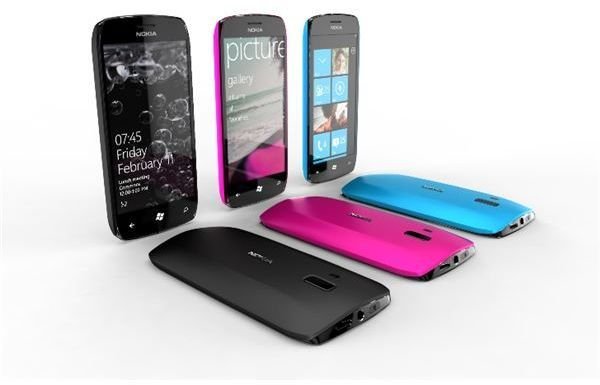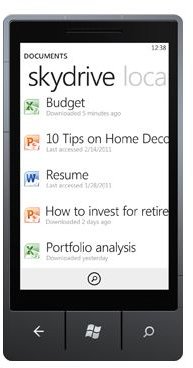Windows Phone 7 Market Strategy Flaws? What Flaws?
When Microsoft returned to the mobile phone arena in 2010 with Windows Phone 7 they were pretty much in the last chance saloon as mobile phone platforms go. With the failure of the Windows Mobile platform in breaking away from its PDA roots – thereby remaining a stripped down “Windows on a phone” user interface – it looked as though they would either have to radically strip down investment into their mobile business or give up entirely.
Instead, Windows Phone 7 was conceived, a fast, efficient operating system with a smart, stylish user interface that owed a little to the Zune HD media player.
The UI has been well received, developers have flocked to the platform and Windows Phone 7 seems to be doing OK for a brand new mobile OS in a sea of other, competing mobile platforms.
From a personal point of view, I love this platform. While there are a few restrictions (most of which should be ironed out with the Mango release), it is everything a mobile phone should be in the second decade of the 21st century.
Which is why I was surprised to find that eWeek’s Don Reisinger listing a selection of so-called marketing flaws in a stinging critique of Microsoft’s commitment to the phone (" Microsoft’s Windows Phone 7 Market Strategy: 10 Major Flaws").
Not surprised as in “wow, I’ve been waiting for someone to say this,” but surprised as in “wow, has he even owned a device, spoke to a user or played with the UI? Has this guy even done any research?”
Let’s address the points of the article in order…
“Where are the top-notch phones?”
That’s an odd question. Given that the platform was conceived and built in 2009 and Microsoft made deals throughout 2010 with major developers such as HTC, Samsung, Dell and LG to provide hardware, and that Nokia are coming on board with their own devices in 2012, it seems as though the article is asking why there aren’t any devices that are of a higher spec than some of the others.
In actual fact, the HTC HD7 and Dell Omnia 7 devices were touted as the big guns in the release, but of course release phones with wildly different specs (such as some With 1 GHz CPUs and others with 1.5 GHz processors) would have led to instant platform fragmentation, something that cursed Windows Mobile, and is currently haunting Android.
“The update process is a killer”
…only if you own a Samsung. Microsoft came clean quite early on and admitted that there were problems with the distribution of their first update, but the actual process of updating a phone is pretty straightforward.
Only the Samsung users have had any considerable issues, most of which seem to have been caused by a lack of communication between Microsoft, Samsung and some of the carriers. On the whole, Microsoft’s first mobile phone update project was successful, and was certainly more timely than the average Android update.
“Nokia’s troubles”

Nokia is a big question, and Reisinger pretty much hits the nail on the head when he points out that many users are abandoning the manufacturer and that it should be just one of many strategies that Microsoft should be using to promote and develop Windows Phone 7.
However, while they are no longer the biggest mobile phone manufacturer in the world, Nokia still has a remarkable pedigree in this area. Microsoft might just have made the best decision possible for Windows Phone 7 and Nokia alike.
“There’s no answer to Android”
The idea that Microsoft might beat Android is flawed – certainly Windows Phone would need a good 6-10 years to be able to do this effectively, and the only thing in its favor at present (beyond the strong operating system and user interface that doesn’t look “borrowed” from Apple’s icon-driven opus) is the fact that Microsoft has already experienced platform fragmentation and no doubt learned from it.
Android, meanwhile, is in the middle of a bizarre situation where older version 1.5 devices are still on sale in shops alongside 2.2 handsets. This is major fragmentation, and only time will tell what it does to the platform as a whole. Short term, however, the realization by new users that some apps will not work on all devices isn’t helping Android.
Given how various Android vendors are looking at ways of incorporating Facebook more wholly into the platform, perhaps the statement should have been “Android has no answer to Windows Phone.” After all, social networking and contact management are key elements of this platform.
“Vendor support is off”
Don Reisinger is absolutely right with this observation, but the problem is much larger than just hooking in Acer and Motorola. At the business end, the customer-facing outlets aren’t promoting Windows Phone, and this has to be down to a lack of focus and benefits in this area from Microsoft.
The story is the same in North America, Britain and Europe – anyone walking into a branch of any of the popular mobile phone networks asking about a Windows Phone gets diverted to an Android or an iPhone. Clearly either these sales people have not been educated about Windows Phone or they’re not getting a good enough commission.
However, the case is not the same for apps and developers, regardless of what Mr Reisinger might think.
“The apps are slow to catch up”
This is a bizarre observation. Reisinger states points out that the Windows Phone Marketplace has just 25,000 apps, and goes on to say: “That’s not a good thing when one considers that the Android Market officially has more than 250,000 available applications (and unofficially, 425,000 apps, according to Androidlib), and Apple’s App Store has 425,000 applications.”
Of course, he’s not suggesting that the Android Market of Apple App Store started off with those amounts; that would be silly. The eWeek contributor is of course more than aware that the Windows Phone Marketplace has already been confirmed as the fastest-growing mobile app store to date, beating its two main competitors to 10,000 apps by several days.
It is the Marketplace and specifically Xbox LIVE gaming that Microsoft should really be focusing on to promote the platform. Perhaps even selling Windows Phones with a free Xbox 360, or vice versa, to set the gamers tongues a-drooling…
“Mango shouldn’t have been the first update”

Um, Don, Mango is the second update, third if you want to be really precise. What you surely meant to say was “Mango should have been the first update”.
That would have been the first accurate observation in the whole column! While the upgrade issues are overstated, the state of Windows Phone post-Mango will be pretty much what I and a lot of other users were expecting from the initial launch.
But let’s not under-estimate Microsoft here; the company knew that a successor for Windows Mobile was required, and they took the steps to develop it, bring in big name phone builders and release a working version of the OS to gauge opinion.
Reviews of the original release were encouraging; reviews of Mango have been positively glowing. Should Microsoft have thrown everything at a platform that they didn’t know for sure was going to be adopted?
Of course not.
“Consumer confidence is slipping”
There is absolutely no evidence that this is the case – in fact following the recent news that 1% of mobile Internet users in North America are Windows Phone owners, that still represents a 100% increase on the previous year when there were no WP7 users at all!
Let’s face it, consumer confidence is slipping in all areas thanks to current state of the global economy. The eWeek article has thrown this in as some sort of damning indictment of Windows Phone when there is genuinely nothing to measure against.
“The enterprise doesn’t care”
Again, Don Reisinger makes a claim with no facts or documentary evidence to back it up. Clearly there are enterprise level businesses and organizations using Windows Phone 7 – you only have to look at the Microsoft support pages to find instances of issues between the platform and Exchange 2003, which some businesses are still using all these years later.
What the enterprise market might care about more than email – and let’s face it, everyone can do email sync these days – is the presence of the Microsoft Office Mobile suite of Word, Excel, PowerPoint and OneNote, and the ability to sync documents created with these apps to a corporate SharePoint site.
“Microsoft hasn’t gotten involved in hardware”
The eWeek article finishes on what is initially a strong point, but one that then gets negated through a lack of research “Microsoft… should consider offering hardware of its own. It might be out of character…”
Except for the Zune, the two Xbox consoles, the Kinect, various mice and keyboards… the list goes on!
And of course, Microsoft HAS been involved with the hardware of Windows Phone, which it has done by imposing strict system requirements in order to avoid the platform fragmentation that is currently affecting Android. Their coming joint venture with Nokia deals with the “self-branding” side of things, allowing close control over the handset with the biggest name in mobile phones from the last 20 years.
After all, Google didn’t buy a mobile phone factory to make Nexus phones did they? No, they contracted HTC to do the job.
Ten Flaws? How About One Flaw?
The whole state of the Windows Phone 7 marketing strategy is an issue that needs to be addressed with focus and purpose rather than a sensationalist “Ten Points Why Windows Phone 7 Sucks” article with “constructive” spin.
It’s good that eWeek offered some column space to the platform, but some research and precision could really have helped.
One last word to eWeek’s Don Reisinger – you could earn a bit of street cred by taking advantage of AT&T’s $299 offer on the Dell Venue Pro and actually spend a bit of time with an enterprise-focused Windows Phone…
And realize how wrong you were.
References
Reisinger, Don. “Microsoft’s Windows Phone 7 Market Strategy: 10 Major Flaws”, https://www.eweek.com/c/a/Mobile-and-Wireless/Microsofts-Windows-Phone-7-Market-Strategy-10-Major-Flaws-563129/
“Dell Venue Pros on Sale on eBay”, https://www.windowsphonethoughts.com/news/show/113222/dell-venue-pros-on-sale-on-ebay.html
Image credits: Windows Phone Newsroom, https://www.microsoft.com/presspass/presskits/windowsphone/
